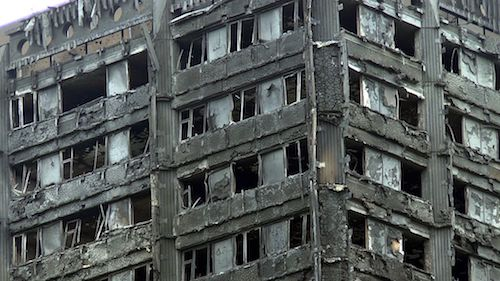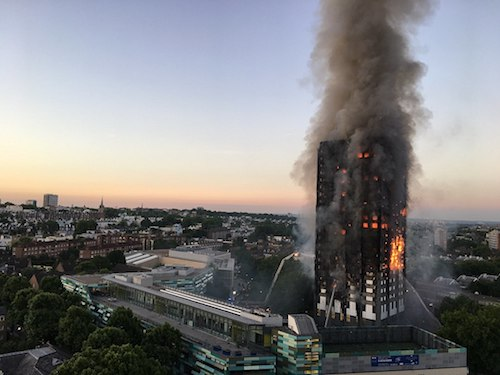Grenfell Inquiry: Industry Rules Dangerously Lax
THURSDAY, DECEMBER 21, 2017
The interim report from the building regulations review that was ordered after London’s Grenfell Tower fire has found that the system is “not fit for purpose,” and left the conductor of the review “shocked” at what she saw.
The Review
Dame Judith Hackitt, a chemical engineer, led the review and issued her preliminary report to Parliament on Monday (Dec. 18). Calling for a complete overhaul of the construction industry, the report details concerns with privatization of inspections and a lack of knowledge among local authorities.

 |
| ChiralJon, CC-SA-BY 2.0, via Wikimedia Commons |
|
The interim report from the building regulations review that was order after London’s Grenfell Tower fire has found that the system is “not fit for purpose,” and left the conductor of the review “shocked” at what she saw. |
“There are notable concerns also that third-party inspections are open to abuse given the potential conflict of interests, with growing levels of mutual dependence between developers and contracted inspectors,” the report says.
Hackitt says that the way regulations are written is causing a problem. Partly because there are too many opportunities for loopholes and shortcuts, she says, but also because many are made to be more complex then they need to be, resulting in a lack of understanding on how to enforce—or even look for—certain requirements.
“It’s a combination of the two,” Hackitt said during an interview with the BBC. “When regulations are complex it makes it quite difficult for people to penetrate that complexity to truly understand what they are required to do. … There are issues of competence to be addressed as part of this.”
She also called for an end on cost-cutting on materials, taking a stance just short of banning materials altogether.
It’s that practice, in which the building that is designed is not the one that’s built, that is thought to have caused the fatal fire in June. Hackitt said that the next phase of the review for the final report, which is due in spring, will look closer at specifics such as cladding, building design and sprinkler/alarm systems.
Reaction
Many reacted favorably to Hackitt’s first draft, though they note that much of this has already been brought up.
“Ministers have already been told that building safety rules need to be rewritten,” said John Healey, the shadow housing secretary. “It is now four-and-a-half years since two coroners’ reports into previous high-rise fires recommended an overhaul of building regulations. Ministers ignored the recommendations then and their promise to issue new regulations was never honored.”
 |
| Natalie Oxford, CC-SA-BY 4.0, via Wikimedia Commons |
|
Hackitt also called for an end on cost-cutting on materials, taking a stance just short of banning materials altogether. It’s that practice, in which the building that is designed is not the one that’s built, that is thought to have caused the fatal fire in June. Hackitt said that the next phase of the review for the final report, which is due in spring, will look closer at specifics such as cladding, building design and sprinkler/alarm systems. |
The Guardian reports that Healey went on to say that government officials shouldn’t even wait for the final report in the spring to start implementing changes.
The Royal Institute of British Architects, which has been vocal about the entire reaction to the Grenfell disaster, was satisfied with most of the report, it said, but thought it could go further.
“I’m pleased that Dame Judith Hackitt recognizes the current regulatory system is not fit for purpose and that there is a lack clarity of roles and responsibilities in the construction industry,” said Jane Duncan, immediate past President of RIBA and chair of the RIBA’s Expert Advisory Group on Fire Safety.
“It is disappointing that the interim review has not called for an immediate prohibition on the use of any combustible materials in the external wall construction of high-rise buildings. This means we continue with this grey-area in regards to fire-safety.”
RIBA Is also calling for the final report to require a named person or organization to be held accountable for the oversight of fire safety in the design and construction of a building project, and for the report to introduce immediate changes to Approved Document B, the current fire safety guidelines.
Tagged categories: Building codes; Building Envelope; Fire; Government; Health and safety; Regulations; Safety







